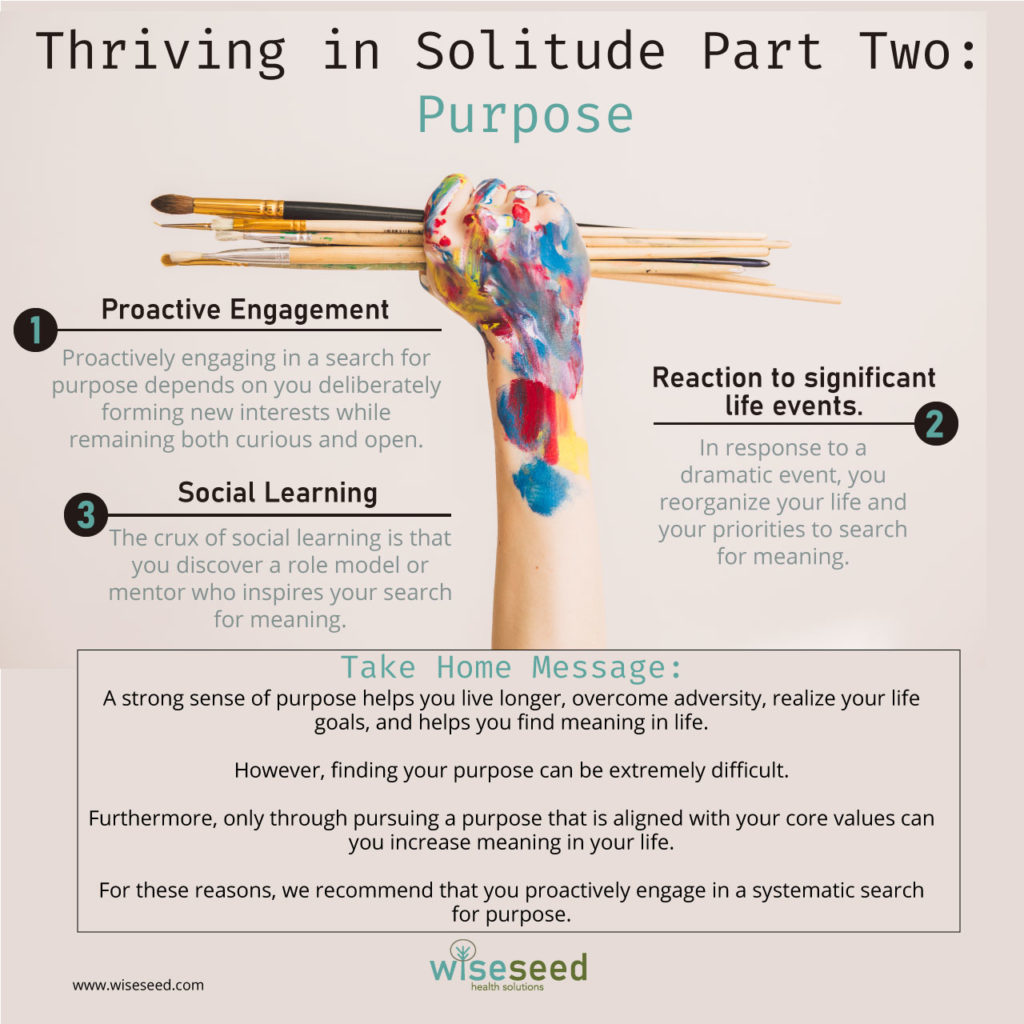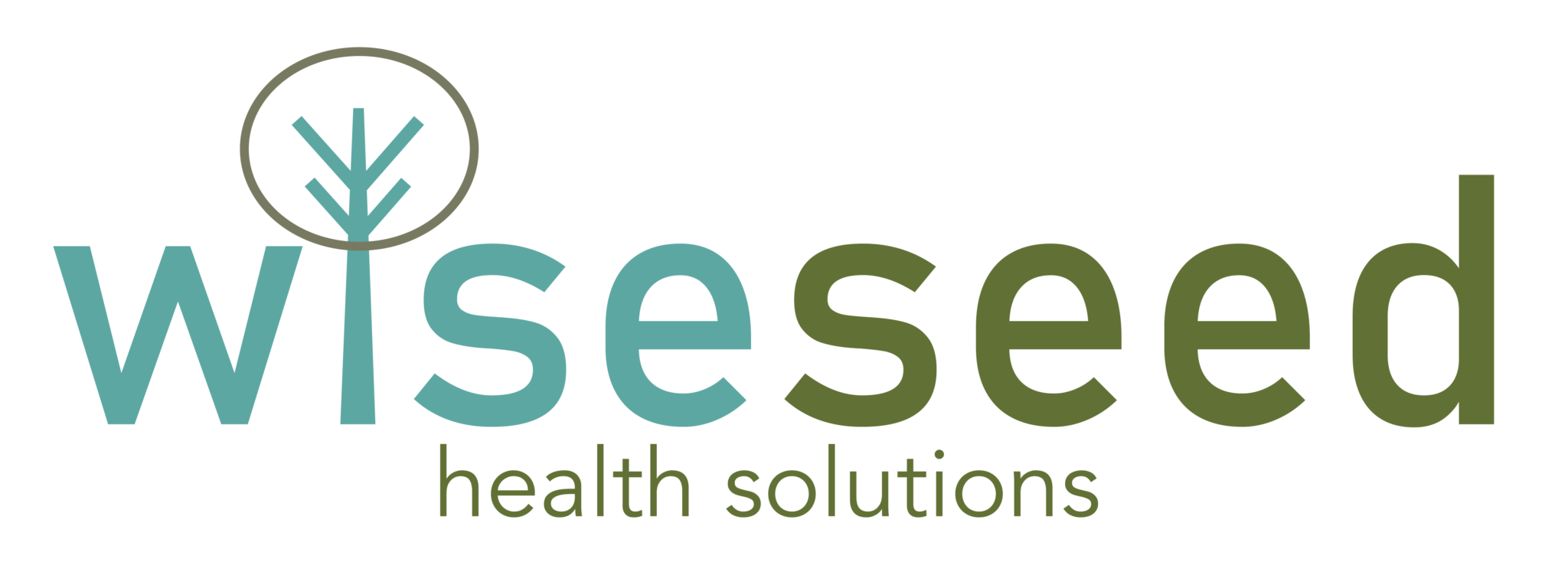Thriving in Solitude Part Two: Purpose

‘Some psychological factors are more important than others for staying on course toward a fulfilling life despite obstacles, failures, and the absence of positive feedback.’
Todd B. Kashdan & Patrick E. McKnight (1)
It’s an unfortunate fact that life is hard for many people. It’s your ability to get back up, recover and move forward that allows you to flourish in life despite adversity and hardship.
To help you thrive in adversity, we’ve been developing a range of strategies that can increase your everyday resilience. However, in my opinion, there is one resilience domain that reigns supreme: Purpose. If you have a strong sense of purpose, you can take an absolute beating, get up, dust yourself off, and keep going.
Granted, many people live long and happy lives without a strong sense of purpose (1). This is because they have other resources to call on, such as a strong social network, or they are just lucky in life.
However, you are far more likely to flourish if you have a strong sense of purpose. After all, you may not always be able to depend on either your social network or luck to save the day. But you can always depend on your purpose!
For the more solitary souls of the world, the good news is that you don’t need other people to have a strong sense of purpose. In fact, just the opposite. Your purpose can be conceived by you, developed by you, and instantiated in the world by you.
What is purpose?
Purpose is eloquently defined as your ‘central, self-organizing life aim’ (1).
Central refers to the fact that purpose is a fundamental component of your personality (1).
Self-organizing means that your purpose serves as a scaffold for your behavior and decision-making. Purpose helps define your goals, motivates you to realize those goals, and determines how you allocate your resources and time in achieving your goals (1).
Life aim suggests that purpose is an overarching ideal. Thus, there is unlikely to be a defined end to your journey. Rather, a sense of purpose serves to guide your life in a direction that is influenced by your core values (1).
Purpose can be thought of as striving towards your most cherished goals and being committed to achieving their ends (2). However, you must align your life aim with your core values, otherwise you won’t be committed to achieving it! If you don’t know what your core values are, refer to our article on making sense of your life for help.
Why having a purpose is awesome!
1. Purpose helps you to live longer.
Having a strong sense of purpose predicts longer life in adults (3). This trend holds true for adults young and old, and for all races and genders (3). Most importantly, the ability of purpose to reduce mortality is independent of other factors known to contribute to mortality risk (3). Altogether, these findings suggest that having a strong sense of purpose can increase your lifespan.
2. Purpose makes you more resilient.
We’ve already discussed the role of purpose in increasing your resilience. To briefly recap, having a strong sense of purpose motivates you to persist in your efforts and overcome major obstacles in your life journey. Further, a strong sense of purpose can compensate for when your other resources dwindle during times of prolonged hardship and adversity (1).
3. Purpose increases meaning in life.
Finally, have a strong sense of purpose has a strong positive effect on your subjective experience of life. Purpose can enhance your well-being by increasing feelings of life satisfaction, mindfulness, and serenity (1). Purpose increases your engagement in life, making your life feel meaningful and worthwhile (4). The pursuit of goals that you perceive to be valuable and important increases your well-being and flourishing (5).
However, you should keep in mind that only through pursuing goals that are aligned with your core values can you increase meaning in your life (6).
Why is finding your purpose so difficult?
Why is it that most people haven’t yet worked out their purpose?
Part of the answer is that (at least) four major life factors must align with your purpose to avoid catastrophic conflicts. Unfortunately, inding a purpose that is aligned with all these factors is extremely challenging.
1. Your purpose and core values must align.
For you to find a meaningful purpose, your sense of purpose must align with your core values. If you haven’t yet worked out your core values, or your current purpose conflicts with one or more core values, then you aren’t on the path to a meaningful life.
2. Your purpose must fill you with passion!
Your sense of purpose should inspire you to push through all sorts of obstacles and setbacks that you encounter in life. This will only occur if your purpose fills you with passion! Just remember that it often takes time for interest to develop into a full-blown passion. Thus, you must follow your interests and do the necessary work to discover which interest ignites your passion.
3. Your purpose should align with your talents.
For you to realize the life goals that are defined by your purpose, you must have sufficient talent to accomplish those goals. For example, having the purpose of becoming a singing sensation will be impossible if your vocal range is minuscule. Therefore, it is necessary to align your purpose with your natural talents.
4. Your purpose should support, or at least not damage, your ability to make a living.
You live in a highly competitive, complex, and rapidly evolving world. Because of this, it is optimal if your purpose supports your career. For example, perhaps your purpose is to create great art. Here, you could develop your artistic talents by building a career in video game development or graphic design. In this example, your artistic ambition supports your career and vice versa.
At a minimum, you must ensure that pursuing your purpose doesn’t damage your career or family.
How to develop a sense of purpose.
Now we come to the most important part of this article, how to develop a strong sense of purpose. As discussed above, discovering your purpose is difficult, and in most cases requires intense effort over a long time.
Fortunately, there are three established pathways that you can use to develop your sense of purpose. These are (i) proactive engagement, (ii) reaction to significant life events, and (iii) social learning (1).
1. Proactive Engagement
This is the most effective method of the three to find your purpose (7). Note that this approach requires a ‘strong tendency toward curiosity and sustained attention regardless of the demand’ (1).
Your success when using proactive engagement depends on you deliberately forming new interests while remaining both curious and open. The more that you explore the world and experience different opportunities, the greater the likelihood of encountering truly meaningful goals and aspirations that are compatible with your core values. Hopefully, you will recognize and take advantage of those experiences that lead you closer to finding your purpose (1).
Interestingly, individuals who use a proactive approach are most likely to discover a purpose that involves helping others (prosocial), followed by a purpose aligned with a creative endeavor (7).
Finally, we recommend this approach for solitary individuals and introverts, as it relies entirely on your own agency. This means that you can effectively use this strategy in solitude.
2. Reaction to significant life events.
Here, your search for purpose is triggered by a major, transformative life event (1). In essence, circumstance thrusts you into a search for meaning. In response to a dramatic event, you re-organize your life and your priorities to search for meaning (1). Interestingly, most people who use this approach find a purpose that involves helping others (7).
3. Social Learning
The crux of social learning is that you discover a role model or mentor who inspires your search for meaning. Through observation and positive interaction, you learn the value of developing a sense of purpose (1). In this case, your sense of purpose comes from other people (1).
What’s interesting about those who have found their sense of purpose through social learning is that their sense of purpose is most often associated with creativity (7).
An integrative approach to finding your purpose.
Although there are three defined paths to purpose (1), many people use more than one approach (7). We recommend that you do the same.
For example, if you have just experienced a significant life event, or you are fortunate enough to have access to a friend, mentor, or colleague that inspires a sense of purpose, we suggest that you also proactively engage in searching for your purpose. That way, even though your search of purpose may have been triggered by an external stimulus, you will greatly improve the likelihood of finding your purpose through engaging your own agency.
On the other hand, if you are already proactively searching for a purpose, why not take advantage of the other two methods?
For example, you could (and should) seek out mentors who can inspire and teach you during your search. Alternatively, you could deliberately engineer a significant life event, for example by undertaking a spiritual or artistic journey.
In fact, integrating all three approaches may give you the greatest chance of finding your purpose.
Start by proactively engaging in a search for purpose. Then, seek out mentors and teachers who are likely to help you in your search. Finally, consider embarking on a life adventure centered around your search for purpose. Such an adventure should be sufficiently challenging so as to shock you into looking at the world (and your life!) in new and exciting ways.
Take Home Message
Purpose is the big kahuna of human resilience. Why? Because a sense of purpose helps you live longer, overcome adversity, realize your life goals, and find meaning in life.
However, finding your purpose can be extremely difficult. For this reason, we recommend that you proactively engage in a systematic search for purpose. Remember to be on the lookout for teachers and mentors who inspire you. Finally, embarking on a life adventure may help expand your worldview and thereby enhance your search for purpose and ultimately, meaning in life.
Please click on the link below for your free PDF.

References and Further Reading
1. B. K. Todd, E. M. Patrick, Origins of Purpose in Life: Refining our Understanding of a Life Well Lived. Psychological Topics 18, 303 (2009).
2. L. S. George, C. L. Park, Meaning in life as comprehension, purpose, and mattering: Toward integration and new research questions. Review of General Psychology 20, 205-220 (2016).
3. P. L. Hill, N. A. Turiano, Purpose in life as a predictor of mortality across adulthood. Psychological Science 25, 1482-1486 (2014).
4. L. A. King, J. A. Hicks, The Science of Meaning in Life. Annual Review of Psychology 72, 561-584 (2021).
5. R. A. Emmons, Personal strivings: An approach to personality and subjective well-being. Journal of Personality and Social Psychology 51, 1058 (1986).
6. K. M. Sheldon, L. Houser-Marko, Self-concordance, goal attainment, and the pursuit of happiness: Can there be an upward spiral? Journal of Personality and Social Psychology 80, 152 (2001).
7. P. L. Hill, R. Sumner, A. L. Burrow, Understanding the pathways to purpose: Examining personality and well-being correlates across adulthood. The Journal of Positive Psychology 9, 227-234 (2014).
Acknowledgements
Images by Javier Gea and Georgii Boronin
Disclaimer
The material displayed on this website is provided without any guarantees, conditions or warranties as to its accuracy.
Information written and expressed on this website is for education purposes and interest only. It is not intended to replace advice from your medical or healthcare professional.
You are encouraged to make your own health care choices based on your own research and in conjunction with your qualified practitioner.
The information provided on this website is not intended to provide a diagnosis, treatment or cure for any diseases. You should seek medical attention before undertaking any diet, exercise, other health program or other procedure described on this website.
To the fullest extent permitted by law we hereby expressly exclude all warranties and other terms which might otherwise be implied by statute, common law or the law of equity and must not be liable for any damages whatsoever, including but without limitation to any direct, indirect, special, consequential, punitive or incidental damages, or damages for loss of use, profits, data or other intangibles, damage to goodwill or reputation, injury or death, or the cost of procurement of substitute goods and services, arising out of or related to the use, inability to use, performance or failures of this website or any linked sites and any materials or information posted on those sites, irrespective of whether such damages were foreseeable or arise in contract, tort, equity, restitution, by statute, at common law or otherwise.

Ten Minutes is All You Need
Research has shown that ten minutes of moderate-to-vigorous exercise performed each day is enough to significantly reduce your risk of early death.

How to Improve Cognitive Functions
The latest research suggests that by improving your cognitive functions through training, you can become more resilient and increase your chance living a meaningful life.




